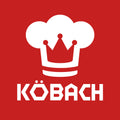How to use, clean, and care for your Kobach
We know you enjoy the look of your Kobach pans as much as how they perform in your kitchen. We have prepared the below content to further explain the best ways to properly and safely clean your Kobach cookware pieces. If you are not finding what you need below, feel free to contact us so we can better assist you.
KÖBACH Stainless Steel Cookware Instructions
1. First-time Use Instructions
Clean thoroughly: Before first use, wash the cookware with warm soapy water to remove any residues.
Preheat the cookware: Use low to medium heat. Evenly coat the inside of the cookware with cooking oil or butter. Heat for 2-3 minutes before you start cooking.
2. During Use
Quick heat conduction: KÖBACH stainless steel cookware features a multi-layer composite structure that ensures fast and even heat distribution. We recommend cooking on low to medium heat. You no longer need high heat, saving energy and reducing gas usage.
Safe with metal utensils: KÖBACH cookware is safe to use with metal spatulas, whisks, spoons, and other utensils. However, sharp utensils may leave scratches. If this happens, it is purely cosmetic and will not affect the cookware's performance or safety.
3. After Use
Cooling down: Allow the cookware to cool completely for 5-10 minutes before washing.
Cleaning: KÖBACH stainless steel cookware can be cleaned with durable sponges such as steel wool. For tougher stains, soak the cookware in warm soapy water for 10-15 minutes, then scrub with a more durable sponge.
4. After-Sales Warranty
KÖBACH stainless steel cookware is covered by a lifetime warranty against manufacturer defects. Damage caused by improper use (including but not limited to overheating, misuse, neglect, improper storage, use of sharp utensils, or improper cleaning) is not covered under this warranty.
KÖBACH stainless steel cookware is eligible for return within 1 year if it becomes sticky due to causes other than design defects.
Contact Customer Service: Before initiating a return or exchange, please contact our customer service team for detailed information on the process.
Cleaning
Cleaning Tips:
Let your cookware cool completely before running cold water over its surface to avoid thermal shock (meaning it might crack—yikes!). Your pans can withstand extreme temperatures on both ends of the spectrum, but sudden and significant changes can reduce their lifespan. Hand wash pans in warm soapy water. We recommend using nylon scrubbing pads or a soft sponge and advise against oven cleaners, steel wool, steel scouring pads, harsh detergents, or detergents containing chlorine or peroxide bleach which can damage the pan’s surface and exterior.
If severe amounts of burned grease or food residue collect and become too difficult to remove through normal cleaning try bringing a 50/50 mixture of white vinegar and water to a boil in the pan. Then use a wooden spoon to carefully remove stuck-on bits.
